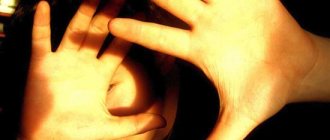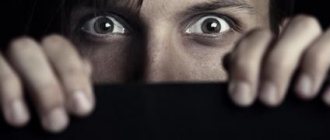.
We all fight against dirt and try to surround ourselves with cleanliness because we are afraid of contracting diseases and being attacked by bacteria. Some people are so afraid of germs and dirt that they take cleaning, disinfestation and other manipulations to destroy bacteria to the point of absurdity.
Fear of germs or germophobia is not just an obsession with living clean, but a disease that needs to be fought.
Germophobia - fear of germs
Concept of fear of germs
Most psychotherapists tend to believe that germophobia is not a separate disease, but a manifestation of obsessive-compulsive disorder (OCD). People suffering from this disorder see themselves in constant danger of becoming infected with germs and getting sick. The main fear that is present in a person suffering from germophobia is associated with rooms, objects and objects “infested” with germs. It seems to the patient that they are everywhere and can cause him harm. A phobia is born in the subconscious as a result of the inability to see the object of fear. This is not only a fear of germs, but a fear of an invisible enemy that can harm the body while remaining unnoticed.
Mysophobia, automysophobia and entomophobia
Along with germophobia, the patient is afraid of germs, dirt or dust pollution, which are the main source of proliferation of bacteria and microbes that can cause a variety of diseases. A phobia associated not only with the fear of germs themselves, but also with obsessive thoughts that they can make you sick, is called mysophobia (literally “fear of dirt”). What is mysophobia? In fact, it is the fear of infection that makes a person panicky about touching any surfaces and objects that may pose a danger. Mysophobia, according to psychologists, is an indispensable companion in the life of a germaphobe who runs in panic away from dust and dirt. The reason why automysophobia appears is identified, and it is also present in a person suffering from a fear of germs. This is the fear of being dirty.
Fear of dirt is a type of germophobia
What else is a germaphobe afraid of? Insects can also frighten him, as a result of which a kind of entomophobia (fear of insects) develops. It is not their appearance that worries the patient, not the likelihood of being stung or bitten, but the fear of getting an infection from a passing cockroach or a flying fly. A phobia of germs forces a person suffering from germophobia to avoid any place where an insect might be found.
Mysophobia is the fear of dirt and germs
Mysophobia is characterized as an obsessive, irrational fear of contamination/disease of the body with various microbes or bacteria.
Panic fear of dirt (Misophobia) and the microbes found in it (Germophobia) are two very similar painful phobias, characterized by the fact that the person suffering from them is very afraid of everything potentially infected with harmful microorganisms. As a result, he tries his best to avoid touching things around him and is afraid of tactile contacts with other people. Experts are convinced that the rapid increase in cases of mysophobia among the population is associated with the advertising of antibacterial agents. It is in such commercials that the environment is presented as a breeding ground for terrible harmful microorganisms that harbor dangerous illnesses.
Against this background, the “beginning” mysophobe develops an obsession that the more often he washes his hands, the lower the risk of contracting any infection. However, such activity quickly turns into a ritual, which only increases panic and reduces the body’s natural immunity to diseases.
Mysophobia is the fear of dirt and germs
Disease and dirt penetrate everywhere. Keep your dishes clean.
Vladimir Vladimirovich Mayakovsky YOU WILL LEARN FROM THE ARTICLE: [hide]
ADDITIONALLY
As a result of research, psychologists have identified a number of reasons that contribute to a person’s fear of pollution.
These include:
- psychological trauma or negative life experience, which somehow involves a serious infectious disease that occurred either in the individual himself or in one of his close people;
- the harmful influence of the media, which daily tells about the nightmare microbes living in dust or dirt;
- predisposition to suggestion in an individual;
- parenting, where poor personal hygiene was accompanied by “lectures” about the terrible ailments that would strike a child who did not wash his hands;
- narcissism, perfectionism and inappropriately inflated evaluation. Individuals with such character traits either strive for absolute perfection or believe that they have already achieved it. Dirt for them is a sign of poverty, bad luck and something that spoils the image of the “ideal self” in their life.
Mysophobia, also known as Verminophobia, Germophobia/Germaphobia, Bacillophobia and Bacterophobia, is a pathological fear of pollution.
Symptoms of mysophobia on the face
Signs of mysophobia manifest themselves both in the physiology and psychology of the individual, and in his daily behavior.
Physiological symptoms of fear of germs and dirt include:
- disorders of the gastrointestinal tract, attacks of nausea including vomiting and dizziness;
- severe tremor in the limbs;
- shortness of breath and chest pain;
- increased pulse and heart rate.
It should be noted that in a mysophobe, such symptoms usually appear immediately before contact with a contaminated object. Moreover, the “hotbed of infection” can equally be a handrail on a bus, or a friend’s hand extended in greeting. In especially advanced cases of mysophobia, nausea can be triggered even by thoughts about some dirty thing.
Psychological signs of mysophobia are:
- sudden attacks of unexplained anxiety;
- absent-mindedness, inability to concentrate;
- depressive thoughts, aggravated by fear of death;
- insomnia.
Mysophobia also negatively changes a person’s behavior, greatly reducing his quality of life. Psychologists have identified the following behavioral reactions characteristic of people who are afraid of dirt and germs:
- Voluntary self-isolation.
Mysophobes tend to distance themselves from friends and loved ones, as they consider them carriers of those microbes that they are so afraid of. Also, such people try not to visit public places and are afraid of animals. - An obsessive need to constantly wash your hands.
Those suffering from a fear of infection wash their hands twice as often and for longer. After this, they carefully treat them with antiseptic agents. In advanced cases of mysophobia, a person may constantly wear gloves, hoping that this will protect him from the ubiquitous germs. - Craving for absolute cleanliness in the house.
Mysophobes zealously guard the cleanliness of their own home, trying to create such a level of sterility in the room that even the operating department in a hospital would envy it. Sometimes this goes beyond all reasonable boundaries, since in an effort to preserve cleanliness they impose their rules on others, for example, forcing them to wear shoe covers or asking them not to touch the furniture with their hands. - Avoiding dirt.
A person suffering from a fear of germs cannot be forced to go outside in rainy weather. In addition, they avoid traveling on public transport, and are also afraid to visit toilets in restaurants or cafes. All this makes them extremely inconvenient companions, with whom it is difficult to move around the city. - Antiseptic treatment.
Mysophobes treat not only their hands with antimicrobial agents, but also their wardrobe, workplace, and in general any object they plan to touch. Such a ritual gives them a feeling of additional protection from the harmful effects of infectious agents.
An example of mass misophobia
Unauthorized isolation from society and endless adherence to rituals makes it difficult for a mysophobe to socialize and negatively affects his overall standard of living.
Such people have difficulty adapting to a new team, since colleagues are not always ready to play by their “rules”, subject to ridiculous precautions.
In addition, it is difficult for mysophobes to find a partner; they are willing to endure constant nagging and demands to maintain cleanliness. Therefore, it is not surprising that they often become outcasts and this makes them feel unhappy and abandoned.
The dirt glistens while the sun shines. Johann Wolfgang von Goethe It should be noted right away that it will be impossible to get rid of the panicky fear of germs without the help of a qualified specialist.
Treatment of phobias, especially advanced ones, requires more time and patience on the part of the psychotherapist, as well as a great desire to change on the part of the client. The most effective methods of psychotherapy for mysophobia include the cognitive-behavioral therapeutic model.
During its course, a person is gradually taught to reconsider his attitude towards fear, and is also explained how to better control his own emotions. Schwartz’s “4 steps” technique is excellent for these purposes.
It consists of the following stages:
- correctly place the emphasis (realize that obsessive hand washing is caused not by real life-threatening microbes, but by a phantom fear of getting sick);
- find the root cause of the disease;
- learn to distract yourself from the current experience of fear of dirt and focus on positive thoughts;
- reevaluate your view of the fear of germs, and also look at your behavior from the outside.
Some psychotherapists successfully use hypnosis to treat this phobia in combination with teaching the client autogenic training skills. Hypnotic practices relieve the severity of symptoms, and autogenic meditations, which the client conducts independently at home, increase his self-esteem and confidence in his abilities. However, if help is aimed only at eliminating the manifestations of the phobia, and not at its causes, then after some time the symptoms of mysophobia will definitely return. Finally, I would like to say that mysophobia is not a harmless oddity and a stupid whim, but a serious illness that can turn a person’s life into misery.
Therefore, at the first sign of fear of germs, you should immediately seek advice from a qualified psychotherapist.
Nikanorova Zhanna · 10 Oct, 2018
phobia dirt germs mysophobia
Source: //PsyMod.ru/fobii/2614-mizofobija-bojazn-grjazi-i-mikrobov.html
Causes of fear of germs
The development of such a disease is associated with many reasons, among which childhood trauma occupies an important place. Psychologists have long been convinced that our fears come from childhood, when the fragile psyche is susceptible to suggestibility and easily collapses as a result of various external factors. By giving the child information that there is a lot of infection around, the parent forms:
- severe fear of infections;
- far-fetched fear of getting sick;
- other imposed disturbing thoughts.
The media cultivates information about the increase in the incidence of AIDS among the population and the emergence of unknown infections. This is deposited in the subconscious of those who have a tendency to be suggestible, which leads to the development of a phobia of getting sick and an obsessive desire to create cleanliness and order.
The cause of germophobia is personal negative experience
Fear of cleanliness as a mania can also be born as a result of negative experience. It is usually received when someone close to you has suffered from an infectious disease.
Having experienced an unpleasant experience, a person experiences an obsessive fear of infection, begins to obsessively maintain body and hand hygiene, and also constantly cleans the room.
Fear of dirt and germs: how to treat mysophobia?
Hello, dear readers of the site! Mysophobia is an irrational fear of dirt and germs in it. And today we will look at why it occurs, how it is usually dealt with and by what signs it is determined.
Mysophobia and germophobia are quite similar phobias to each other. Indeed, they usually do not arise alone.
The first, as you have already found out, is the fear of dirt itself, and the second is the fear of microbes that, let’s say, “live” in this dirt.
And that is not all. Quite often they are accompanied by a mental disorder such as OCD (obsessive-compulsive disorder). It consists of an obsession with performing certain rituals in order to reduce anxiety.
For example, a person can wash his hands more than 100 times a day because he is afraid that bacteria getting on his skin will cause allergies, acne, etc.
Naturally, along with the viruses, it also washes away the fat that its sebaceous glands produce for protection and hydration.
Accordingly, the skin in places that he often washes cracks, bleeds and brings a lot of inconvenience.
In general, you can learn more about what OCD is and how to get rid of it from here.
Unfortunately, germaphobes quite often suffer from depression due to misunderstanding and loneliness. The nervous system simply cannot cope with stress and anxiety, which does not leave the body or consciousness at all.
After all, there is so much dirt and germs around, and the fact that they are not visible is even more frightening.
Loneliness arises because not every person is able to be close to someone who demands to wash their hands even after touching their own face. And also carry out disinfection after every step in the apartment.
Daily hysterics, quarrels and misunderstandings gradually destroy relationships, no matter how close and strong they were initially.
Signs of manifestation
A mysophobe may vomit at the thought and the fact that there is dirt on some part of his skin. He is horrified if someone reaches out to say hello. And, moreover, it avoids abandoned places and garbage cans.
Sometimes any public place deprives him of peace and brings him to a state where he loses control of himself and rushes headlong home to escape the bacteria that have taken over the world.
If another person touches his thing, he may well throw it away if it is not subject to disinfection.
Absent-mindedness is observed, since the phobe is usually immersed in his thoughts, which naturally prevents him from responding to external stimuli in a timely manner.
Avoids large crowds of people, sometimes not going out at all. Just imagine what kind of experiences he has to face while traveling on public transport.
Therefore, if it cannot be avoided, he uses products that help keep the skin clean.
That is, be sure to wear gloves and wear a mask so as not to inhale dust. When he gets home, he gives his clothes a thorough cleaning.
He doesn’t invite you to visit, because you never know what kind of infection will be brought into his sterile house. If he is raising a child, he tends to show excessive care.
That is, if a toy falls on the floor, even if it is perfectly clean, it must be disinfected. The baby is strictly forbidden to play with other children on the street, because you never know what you can catch from them. In general, you understand.
Molismophobia (another version of the name) is also diagnosed by a categorical refusal to touch animals. Which are associated with infection and dirt.
When a panic attack occurs, they begin to choke and sweat profusely. They may lose consciousness or “pee in their pants” from fright.
The pain in his heart causes an even greater attack of horror, as it makes him think that he will die now from a heart attack. Blood pressure rises, pulse quickens and legs tremble. Sometimes there are stomach cramps and headaches.
mass media
In commercials, the environment in which we live is presented as deadly.
Because it contains countless microbes invisible to the naked eye, which, when they get on our skin, and then into the lungs, and so on, provoke the development of various diseases.
It is for this reason that it is extremely necessary to treat your home with antibacterial agents. What a home, you should also wash only with soap that can prevent the risk of infection!
And such videos flash with enviable frequency. Moreover, harmful microorganisms are depicted quite clearly, they are militant and look intimidating.
It is not surprising that an impressionable person who previously had no idea how many viruses and all sorts of invisible nastiness he has under the toilet lid, on the kitchen table, on his feet, in pillows, and so on, will acquire obsessive ideas about how to become sterile clean.
He actively buys advertised products, tries not to touch anything again, and immediately runs to wash his hands if it suddenly turns out that he had to take something with them. In general, he loses common sense and lives in anxiety.
Psychological trauma
The development of spermophobia (another name for this disorder) can be provoked by the illness of a loved one, which he acquired through infection in unsanitary conditions.
Or simply by “catching” a viral infection. And, even more so, if he fought painfully with her, experiencing pain and serious illness. Death on this occasion causes serious psychological trauma.
After all, it indicates that we are not omnipotent and are in danger every second while we are alive.
By the way, fear of germs can arise if a person had to undergo a long stage of treatment for some kind of infection that entered his body due to non-compliance with hygiene rules or completely by accident.
For example, if he injured himself on a rusty, dirty object. Tetanus, by the way, is fatal in almost 40% of cases.
Therefore, it is not surprising that after experiencing such an unpleasant story, a person develops post-traumatic syndrome, and a phobia appears from exhaustion of the nervous system.
Upbringing
Parents, sometimes without realizing it, harm their child while trying, on the contrary, to take care of him. I'm talking about phrases designed to “nurture” the skills of self-control and hygiene.
For example, an adult says that: “If you don’t wash your hands before lunch, the germs that are on them will get into your stomach and you will die,” “If you touch your face with dirty hands, worms will appear on it.”
Terrifying, isn't it? Especially for a child who is not yet able to think critically and does not have the necessary knowledge and skills. Why does she meekly trust the opinion of an authoritative parent?
Yes, there is a grain of truth in what has been said, no one needs health problems due to lack of hygiene. But such information should be presented to the immature and impressionable child’s psyche more carefully, depriving it of frightening details.
Heredity
If one of your close relatives has any mental disorder, then there is a high risk of “getting” a similar diagnosis for yourself.
It is also affected by the fact that the child, observing the actions and reactions of the parent, will repeat them.
After all, he does not understand that, for example, a pathological desire for ideal cleanliness is a symptom of mysophobia. He will think that dirt is really so terrible that mom or dad are trying to get rid of it in order to survive.
Treatment
You should definitely consult with a specialist who will not only diagnose or refute the presence of the disorder, but also, if necessary, prescribe medications to improve well-being.
In the process of psychotherapy, you will understand where your molismophobia came from, and you will also understand what needs to be done to improve the quality of your life.
Resolve internal conflicts, relieve unnecessary tension and become aware of the motives for your reactions and behavior. This will allow you to make adjustments in order to realize your needs, and not jeopardize their satisfaction with destructive thoughts and actions.
To improve sleep, the psychiatrist will prescribe sleeping pills. After all, it is difficult to maintain peace of mind and mental health without restoring resources at all.
And antidepressants, if you are in a state of despondency for a long period of time, are not able to recognize your desires. Sedatives will relieve anxiety and relax the nervous system.
The most effective results in the fight against phobias have been shown by cognitive psychotherapy, gestalt and hypnosis.
Group work often helps. When people with similar problems gather in one space and share their experiences with each other, this gives an understanding that they are not alone in this world, that there are those who understand.
After all, mysophobes often face condemnation from others, criticism that they are not themselves and have gone crazy. And also with demands to pull yourself together and stop striving for sterile cleanliness everywhere you go.
But it’s not that simple; germophobia is a mental disorder. And you can’t cope with it through willpower alone. Even if there is an understanding that fear is irrational.
Behavior of germaphobes
The patient has an obsessive desire to wash his hands and disinfect them after contact with any objects, surfaces, or animals. A pathological fear of various microbes that can be caught from contact with dirt leads to the fact that a germaphobe looks for every opportunity to use soap, wears protective gloves and masks.
The fear of pollution forces a germaphobe to monitor cleanliness; even the slightest bacteria cannot be allowed to enter their home.
Characteristic symptoms and signs
Key signs of mysophobia:
- Frequent hand washing. A mysophobe can wash his hands so often that he develops problems with the skin on them: it dries out, flakes and requires additional treatment with moisturizing creams. Many germaphobes constantly wear medical gloves or put them on when necessary.
- Avoiding anything that may be associated with pollution. Mysophobes avoid using public toilets and transport. In some cases, the phobia is so strong that the mysophobe does not leave the house.
- Excessive use of antiseptics. If a person with mysophobia does leave his home, he almost always has wet wipes and sprays with him. He regularly wipes objects in his workplace, door handles, sinks, his clothes, and hands with them.
- The desire to create sterility around oneself. The apartment of germaphobes is always very clean, and when cleaning the house they also regularly use a large amount of antiseptics.
- Avoid contact with animals and people. Because of fear, germaphobes close themselves off and avoid communication, including romantic ones. They can have animals, but they also take excessive care of their cleanliness, and avoid street animals and other people's pets.
- Changes in physical condition. When mysophobes think about germs, see dirt, or accidentally come into contact with an unsterile object, they experience panic, which is accompanied by characteristic somatic symptoms: nausea, vomiting, increased heart rate, weakness, trembling, dizziness, and lack of air. They feel hot or cold, and in rare cases they can even lose consciousness.
Any pollution makes them anxious, so they clean every day.
All this makes life very difficult for mysophobes.
They find it difficult to complete their studies, get a job, or develop friendships or romantic relationships, and they see the world outside the home as an extremely dangerous place.
They often face misunderstanding from other people who notice their oddities. Some germaphobes do not have families because they are too frightened by the thought of close physical contact.
Constant ridicule, bewilderment, and insults coming from other people, even loved ones, force mysophobes to withdraw completely into themselves, which also negatively affects their psycho-emotional state and causes the development of other mental problems, including hypochondria, social phobia, depression, neuroses, obsessive-ness. compulsive disorder, panic disorder, various complexes.
And since the mental state is closely related to the physical, they often get sick. Therefore, it is important to recognize mysophobia in time and begin treatment.
Why do we need a feeling of disgust ? Find out from the video:
Symptoms
Germophobia and mysophobia have symptoms that make them quite easy to identify.
- The patient is engaged in daily cleaning of the room for at least an hour a day.
- He avoids public places where he can become infected (cinemas, fitting rooms in stores, etc.).
- The patient never shakes hands.
- The fear of getting sick with something forces a person to disinfect his hands and premises.
- If a germaphobe sees a sick person or hears sneezing near him, this can cause real horror in him.
- A person suffering from a phobia of germs never holds handrails,
- handrails in vehicles and door handles.
- Fear of dust forces the patient to wipe furniture up to a dozen times a day, causing irritation among relatives and bewilderment among guests at home.
Obsessive hand washing is a symptom of germophobia
The danger of germophobia
A phobia is dangerous because it constantly keeps a person under stress. Germophobes tend to be anxious all the time, fearing for their health. Appearing in public places (shops, toilets, transport) causes a germaphobe to panic and immediately want to wash his hands. The fear of germs literally haunts him.
Panic attacks that such a disease entails can cause constant stress and problems with the social sphere of life.
It becomes difficult for the patient to contact others; he sees them as potential carriers of a dangerous infection and carriers of bacteria. Someone who is afraid of dirty hands can hardly be understood by a boss who extends his palm for greeting.
The patient is driven by a fear of dirt and germs. He is afraid of bacteria, this makes life in society very difficult. There is a high probability that mysophobia can manifest itself in children whose parents have similar problems.
Fear of touching anything










